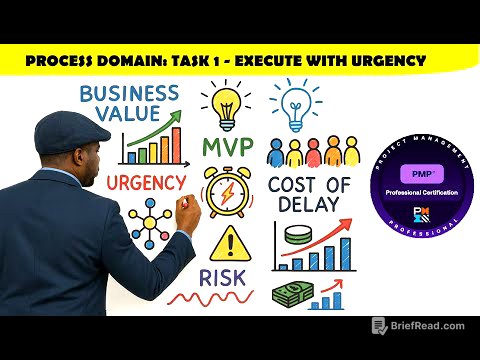TLDR;
This episode of Perspective on Sansad TV discusses the critical role of Micro, Small, and Medium Enterprises (MSMEs) in India's economy, especially on International MSME Day. The discussion covers government initiatives, challenges faced by MSMEs, and strategies for strengthening the sector for a sustainable future. Key points include the significant contribution of MSMEs to India's GDP, exports, and employment, as well as the importance of sustainability, innovation, and access to finance and technology for MSME growth.
- MSMEs contribute nearly 30% to India's GDP and account for almost half of its exports.
- Government initiatives like the RAMP scheme and PM Vishwa Karma aim to support MSMEs through technology, skill development, and financial assistance.
- Challenges include access to timely credit, delayed payments, and the need for technological upgrades to compete globally.
Introduction to MSME Day and India's MSME Sector [0:13]
The host introduces the topic of MSMEs, highlighting their importance as the backbone of India's economy and a key pillar of global growth. MSMEs in India contribute nearly 30% to the GDP, account for almost half of the exports, and provide livelihoods to more than 20 crore people, second only to agriculture. The United Nations designated June 27th as International MSME Day, with this year's theme focusing on enhancing the role of MSMEs as drivers of sustainable growth and innovation. The discussion aims to explore government initiatives, challenges, and the way forward for strengthening this vital sector.
Significance and Evolution of MSMEs in India [2:44]
Pravin Kandelwal emphasizes the significance of the MSME sector, noting that over 9 crore MSMEs provide direct employment to more than 30 crore people in India. He credits Prime Minister Narendra Modi's administration for its efforts to support the growth of the MSME sector, which has contributed to India becoming the fourth largest economy globally. Kandelwal stresses the need for more government support and policies to enable MSMEs to perform even better than the corporate sector.
Sustainability and MSME Development [3:51]
Ashoke Seagel discusses the importance of sustainability for MSMEs, highlighting the need for them to consider their environmental impact, workers' welfare, and the communities in which they operate. He emphasizes the potential for MSMEs to shape the thinking of a large number of people through employment and the importance of Environmental, Social, and Governance (ESG) practices.
MSMEs Role in India's Development by 2047 [5:26]
Rrookmani Atri discusses the crucial role of MSMEs in realizing India's ambition of becoming a developed nation by 2047. She highlights two major initiatives by the Ministry of MSME: the RAMP (Raising and Accelerating MSME Performance) scheme, which aims to provide comprehensive support to MSMEs through coordination with state governments, and the PM Vishwa Karma initiative, which focuses on bringing traditional artisans and craftspeople into the formal sector and encouraging them to become entrepreneurs. She notes the overwhelming response to the PM Vishwa Karma initiative, with enrollment reaching near saturation within two years.
Government Initiatives for Empowering MSMEs [9:01]
Pravin Kandelwal elaborates on various government schemes aimed at empowering MSMEs, including the Mudra Yojuna, skill development programs, and the GEM portal for market outreach. He emphasizes that these initiatives reflect the government's commitment to supporting MSMEs not only financially but also through innovation, awareness, and institutional support. He also mentions the coordination between the central and state governments to boost the MSME sector.
Accessing Government Schemes at the Grassroot Level [11:05]
Rrookmani Atri explains how individuals at the grassroots level can access government schemes and initiatives. She mentions the Udyam registration portal, an online registration portal for MSMEs launched in 2020, which simplifies the registration process. For very small businesses needing handholding, she introduces the Udyam Assist Platform, which provides registration and eligibility for availing scheme benefits. She also highlights the field offices and Development and Facilitation Offices (DFOs) that provide personal support and information.
Challenges Faced by MSMEs: Access to Credit and Delayed Payments [14:48]
Ashoke Seagel identifies access to timely credit and delayed payments as significant challenges for MSMEs. He mentions the CGTMSE scheme, which facilitates working capital financing without collateral, and notes the declining NPA rates of MSMEs, making them a low-risk lending channel for banks. Seagel also discusses initiatives like the "loan within 59 minutes" scheme and the impact of the finance minister's clause in the budget regarding 45-day payment terms. Additionally, he highlights the TReDS platform, which helps MSMEs get payments without recourse.
Strengthening Export Capabilities [18:51]
Pravin Kandelwal discusses India's ambitious trillion-dollar export goal and how it can be achieved. He provides the example of the toy industry, which has become largely self-sufficient and is now exporting significantly. Kandelwal emphasizes that government policies have been designed to provide ease of doing business, finance, technology, and skill development, enabling MSMEs to become self-reliant and meet both domestic and global requirements.
Technological Support for MSMEs: Industry 4.0 [20:46]
Ashoke Seagel discusses the importance of technology and Industry 4.0 for MSMEs. He mentions the DX Edge program, a collaboration between CII and Niti Aayog, aimed at promoting automation and digital innovation in MSMEs, particularly in tier 2 and tier 3 cities. Seagel highlights that while India has lower labor costs, lower productivity offsets this advantage. He emphasizes that automation and data collection can improve quality, enable better commitments to international buyers, and increase business opportunities for MSMEs.
International Partnerships and Competitiveness [23:21]
Rrookmani Atri discusses how international partnerships enhance the competitiveness and innovation capacity of Indian MSMEs. She mentions the Ministry of MSME's IC scheme, which supports MSMEs in participating in international trades and events. Atri emphasizes that these collaborations provide enriching experiences and encourage MSMEs to adopt innovative practices.
Way Forward and Closing Thoughts [24:49]
Ashoke Seagel emphasizes the need to address the finance part and ease of doing business to strengthen the MSME sector. He notes that the increasing enrollment on the Udyam platform indicates that MSMEs are becoming more comfortable being part of the formal sector. Seagel also highlights the widespread use of mobile phones for transactions and UPI payments, suggesting that people are ready to adopt good business systems.
Rrookmani Atri wishes the MSME community well and emphasizes the collaboration between ministries and stakeholder consultation to understand and include MSMEs. She expresses confidence that with these initiatives and the active support of the MSME sector, India will be able to become a developed country by 2047. The host concludes by reiterating Prime Minister Modi's view of MSMEs as a transformative force in India's economic journey and the importance of investing in and strengthening this crucial pillar of the economy.









